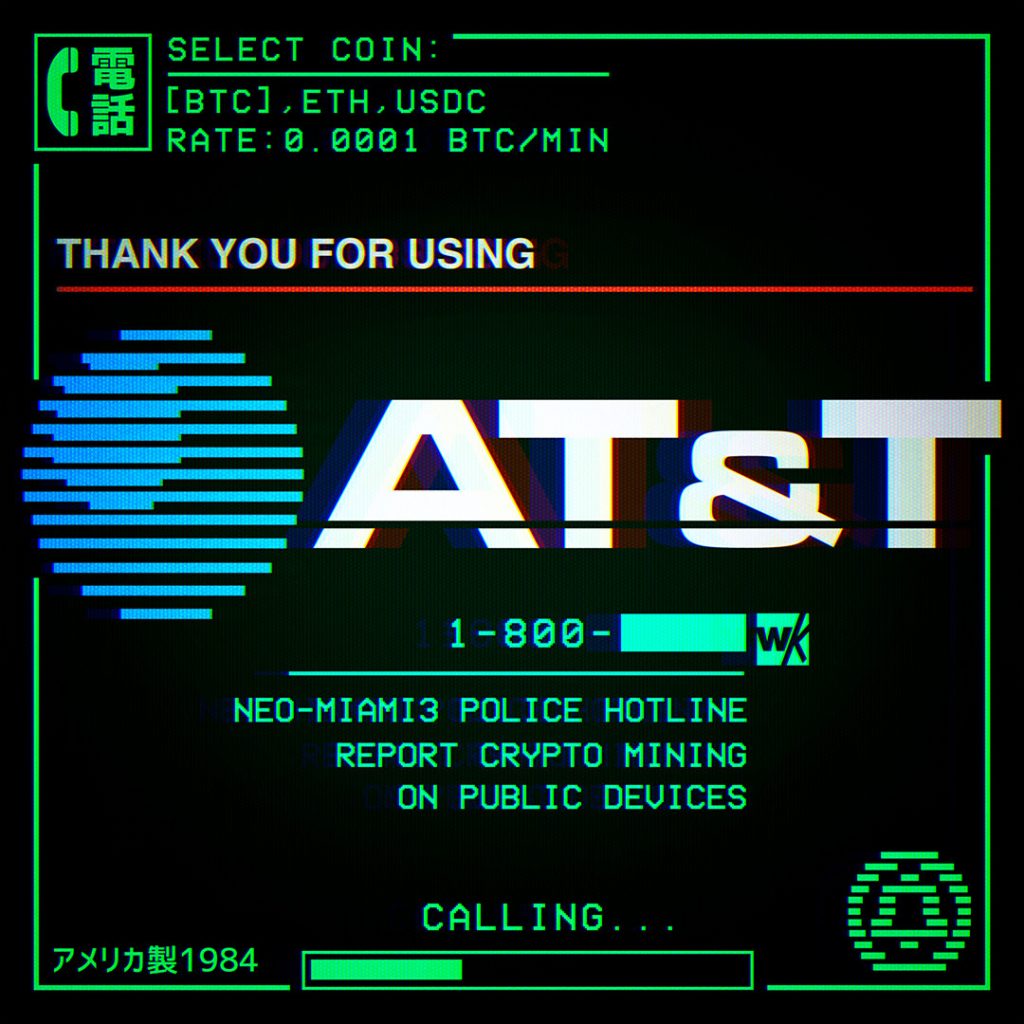https://darth-azrael.tumblr.com/post/705402057530671104/warakami-vaporwave-att-cyberspace-telephone
- Tag Archives AT&T
-
-
Shareholders Demand Transparency for AT&T’s Hemisphere Phone Records Spying Program
A group of investors in AT&T have had it with the phone company’s collaboration with law enforcement through the Hemisphere program, in which the company facilitates police access to trillions of phone records. At the spring shareholder conference, Zevin Asset Management plans to force discussion of contradictions between AT&T’s stated commitment to privacy and civil liberties and the Hemisphere program. One of the chief goals is to demand greater transparency over the highly secretive program.
As EFF recently reported, police refer to Hemisphere as a “Super Search Engine” and “Google on Steroids” because it provides access to trillions of domestic and international phone call records dating back 30 years. Each day, approximately 4 billion phone records are added to the system, including calls from non-AT&T customers that pass through the company’s switches and even when a customer changes phone numbers. Hemisphere can also map out social relationships and pinpoint locations of callers.
Federal law enforcement officials are able to obtain this information without going through a judge, and they are instructed to take devious measures to keep the program out of the public record. AT&T is not a passive responder to police demands. Rather, AT&T retains records longer than its competitors, places its employees at the regional hubs of drug interdiction task forces, and requires police to hide their use of Hemisphere.
Nobody is forcing AT&T to do this; the company could end the Hemisphere program tomorrow.
In a post on Medium, Pat Miguel Tomaino, Zevin Asset Management’s Associate Director of Socially Responsible Investing, explains how the shareholders must use their investments to resist threats to civil liberties under the incoming Trump administration. He writes:
We are shining a light on AT&T’s Hemisphere program, a giant database of customer calls which AT&T runs as a lucrative business line, charging law enforcement agencies upwards of $1 million for bespoke searches and analytics. AT&T says that it follows the law and hands over customer data only when police present a legal demand. But why does AT&T retain more call data than peer companies like Verizon and Sprint? Why does the company allegedly force law enforcement agencies to keep Hemisphere a secret? At AT&T’s annual meeting next year, Zevin will push for answers on this risky business and for an explanation of the gap between the company’s responsible-sounding privacy policies and Hemisphere’s immense scope.
EFF has been fighting for more than a year in state and federal courts for records related to the Hemisphere program to hold the government accountable. Our efforts have yielded, for example, the police email calling Hemisphere “Google on steroids.” But private companies like AT&T are not subject to Freedom of Information laws. So we are pleased to see AT&T shareholders holding the company to account, and trying to compel it to publicly report on the consistency between its Hemisphere spying program and its own privacy policies.
Read the shareholder proposal [.pdf].
-
AT&T requires police to hide Hemisphere phone spying
AT&T built a powerful phone surveillance tool for police, called Hemisphere. Every day, AT&T adds four billion call records to Hemisphere, making it one of the largest known reservoirs of communications metadata that the government uses to spy on us. Law enforcement officials kept Hemisphere “under the radar” for many years—hidden from courts, legislators, and the general public—until the New York Times exposed the program in 2013. EFF sued federal and state law enforcement officials to obtain records about Hemisphere, in part to better understand how and why police kept such a massive spying database secret for so long.
New documents published by The Daily Beast earlier this week reveal that AT&T required this corrosive secrecy. Specifically, the contract AT&T prepared for police seeking access to Hemisphere provides:
[T]he Government agency agrees not to use the data as evidence in any judicial or administrative proceedings unless there is no other available and admissible probative evidence. The Government Agency shall make every effort to insure that information provided by the Contractor is non-attributable to AT&T if the data isprovided to a third-party.
In other words, the first rule of Hemisphere is: you do not talk about Hemisphere. We knew this is the government’s rule. Now we know this is AT&T’s rule, too.
What do police do with the Hemisphere evidence that they cannot talk about? According to a Hemisphere training document, police must “wall off” that evidence, and then recreate it with a traditional subpoena. Police call this “parallel construction.” EFF calls it “evidence laundering.”
The harms of secrecy
This secrecy—imposed by AT&T—is highly disturbing for many reasons. Three deserve emphasis.
First, this secrecy hides Hemisphere from democratic oversight. Hemisphere enables police to map our intimate social relationships by data-mining massive amounts of our call records, usually without a warrant. Yet because of Hemisphere’s secrecy, judges cannot rule on whether the program violates the Fourth Amendment. Legislators cannot oversee the program and enact appropriate legislation. Voters cannot hold their elected officials accountable. Everyone is in the dark, except for a small number of law enforcement and corporate executives, who unilaterally decided to impose this highly intrusive program on the rest of us.
Second, this secrecy deprives criminal defendants of their constitutional right to a fair trial. Under Brady v. Maryland, police must disclose favorable evidence to the defense. When police hide their sources of evidence, the accused cannot challenge the quality or veracity of the government’s investigation, or seek out favorable information still in the government’s possession. Moreover, hiding evidence from individuals who are prosecuted as a result of such surveillance is antithetical to our fundamental right to an open criminal justice system.
Third, the new revelation clarifies AT&T’s role in the Hemisphere program. AT&T suggests that all it is doing is passively responding to lawful government demands for information about its customers. In fact, AT&T actively imposes secrecy on police who wish to use AT&T’s Hemisphere program. AT&T’s motives for imposing this secrecy are not presently known. Perhaps AT&T is seeking to avoid public scrutiny of its Hemisphere business model, which earns millions of dollars from police officials in exchange for access to private phone records that AT&T retains for many years longer than its competitors do.
Sadly, this isn’t the first time that police and corporations worked together to hide from the public their deployment of highly invasive spying tools. For example, corporate nondisclosure agreements contributed to years of secrecy about police use of cell site simulators, often called “Stingrays,” which masquerade as cell phone towers and thus force all phones in the area to disclose sensitive information to the police.
Next steps
We must fully expose Hemisphere to the light of public scrutiny. EFF has used public records laws to uncover many Hemisphere records, and we will add any other documents we obtain to our public library of Hemisphere records.
Looking forward, we must stop the police and their corporate suppliers from unilaterally and secretly deploying new surveillance technologies in the first place. Rather, the decision whether to adopt these sensitive tools should be made by elected officials, at open meetings, following ample opportunity for the general public to study the matter and have their voices heard. EFF supports a national campaign to enact laws requiring this process. In many cases, an informed citizenry and their elected officials will say “no” to new spying tools. In other cases, elected officials will impose necessary privacy safeguards.
AT&T and the police tried to keep Hemisphere secret. They failed. The time has come to end the Hemisphere program. As a matter of constitutional law and basic privacy principles, the police should not be allowed, without case-by-case judicial oversight, to scrutinize our social relationships with a database of trillions of phone records.
Source: AT&T requires police to hide Hemisphere phone spying | Electronic Frontier Foundation


